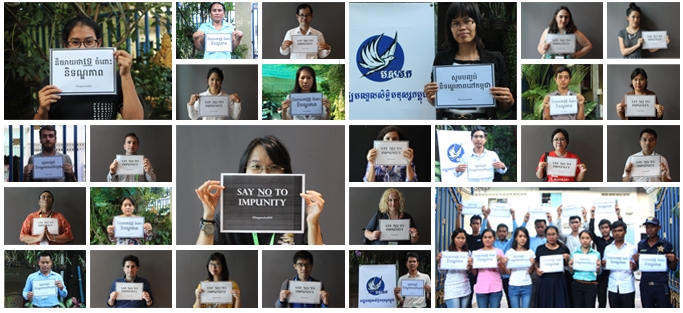CCHR's campaign calls on people to take a photo of themselves holding a sign that calls for an end to impunity. These photos will be collected throughout November, collated into a giant petition poster and delivered to the Ministry of Justice.
This statement was originally published on 3 November 2014.
Yesterday, 2 November 2014, saw the launch of the Cambodian Center for Human Rights’ (“CCHR”) annual End Impunity Campaign, marking the United Nations’ first International Day to End Impunity for Crimes against Journalists. CCHR is taking this opportunity to highlight the rampant nature of impunity in the Kingdom of Cambodia (“Cambodia”), and to generate and relay the public’s call on the Royal Government of Cambodia (the “RGC”) to end impunity.
The campaign calls on people to take a stance against impunity in Cambodia, by taking a photo of themselves holding a sign that calls on the RGC to end impunity. These photos will be collected throughout November and collated into a giant petition poster. On 2 December 2014, the poster will be delivered to the Ministry of Justice, asking the RGC to take action.
Impunity, which means “without punishment” or “without consequence”, is rampant in Cambodia. Human rights activists and journalists often face violence, and many have been murdered, yet their cases remain without thorough or independent investigations. Security forces have used excessive force against protestors, but remain unpunished. Well-connected officials and powerful elites often evade justice, leaving victims without redress.
Between September 2013 and January 2014, six people were killed by security forces during garment workers protests in Phnom Penh, and a 16 year-old boy remains missing, yet little action has been taken to deliver justice for the victims. Furthermore, since 1994, the murders of 12 journalists in Cambodia have been met with impunity, and it is yet unclear whether the recent murder of Taing Try in October 2014 will join this list. For example, in 2012 Hang Serei Oudom was found brutally murdered in the trunk of his car. He had been investigating illegal logging in Ratanakiri province, and just days before his death he had published an article that accused the son of a local military police commander of being complicit in the practice. However, his case has not been thoroughly investigated, and his murderers remain unpunished. You can read about specific cases of impunity at CCHR’s 2013 Impunity Campaign.
The culture of impunity poses a serious threat to human rights within Cambodia, for both the victims of impunity and society at large. Impunity threatens the rights to truth, justice and remedy, and creates fear about speaking out and fighting for justice. Self-censorship undermines the development of democracy within Cambodia. The RGC encourages this fear and halts dissent through its role in the culture of impunity, which restricts people’s access to human rights.
CCHR is calling on you to stand up against impunity. By sending your photo to CCHR, you can call on the RGC to take action to fight impunity.
2014 Campaign Against Impunity
To show the RGC that ending impunity matters to Cambodians, throughout November, we will be collecting photos of individuals holding signs pledging to fight impunity. We will print these photos onto a giant poster and deliver it to the Ministry of Justice on 2 December 2014, to demonstrate the high levels of public demand for ending impunity. We will also be posting all the photos online at: Campaign Flickr Page
What is impunity?
Impunity means, “without punishment” or “without consequence.” In Cambodia, perpetrators of crimes regularly go unpunished and victims never see justice. Often, the perpetrators of crime are well-connected individuals that target those speaking out against human rights violations. However, there is a strong lack of will to convict well-connected individuals, leaving serious crimes without independent or impartial investigations or redress. This culture of impunity directly threatens the rights to truth, justice and remedy, and promotes fear that stifles the right to freedom of expression.
What can you do?
Show the RGC that you care about ending impunity! Simply follow these steps:
1. Print out one of the signs provided by CCHR, or make your own.
2. Take a photo of yourself holding a sign with your pledge to fight impunity
3. Email it to impunity@cchrcambodia.org or Tweet it @cchrcambodia using #impunitykh
Ask your friends to take a photo as well, by sharing yours on Facebook or making it your profile picture.
To be sure that your photo is on the poster that will be delivered to the Ministry of Justice, send it to us before 30 November 2014. You can still send us photos after this date, and they will be posted at: Campaign Flickr Page
If you’re an organization or if you have more than 30 people, and you would like to have photos taken, CCHR can bring a camera and signs to you. Alternatively, you can come to the CCHR Office in Phnom Penh to have a photo taken. Please email impunity@cchrcambodia.org to make an arrangement or call 017 50 50 50.
* Note: By sending your photo to CCHR, you authorize CCHR to publically use or publish your photograph in different outlets (petition poster, Facebook, Twitter, CCHR webpage, etc.) for the purposes of the campaign. Please inform CCHR when sending your photo if you would not like it be used in outlets other than the petition poster.



